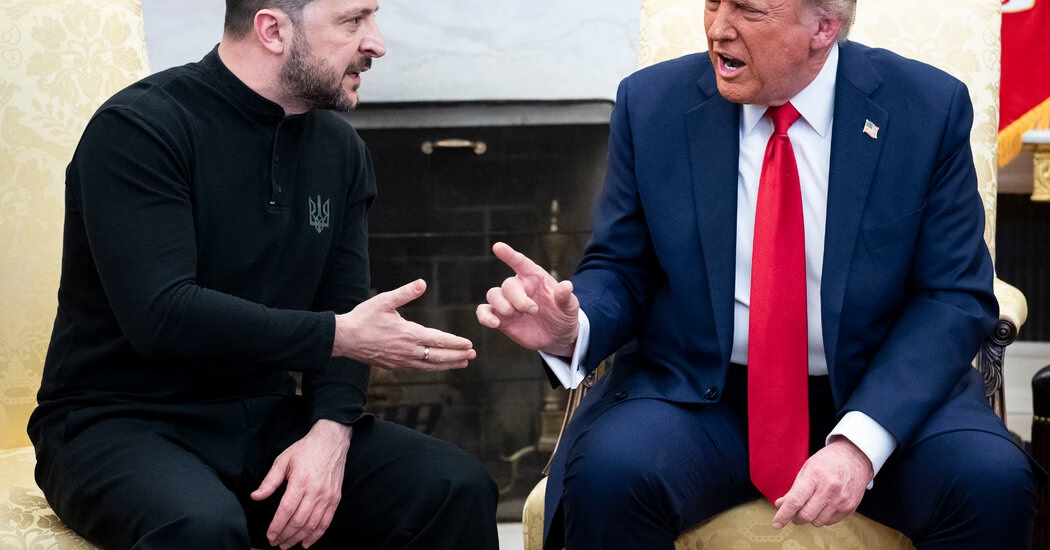After weeks of President Trump expressing his intention to dismantle America’s traditional alliances and return to an era of great-power negotiations, one question lingered: How far would he go in sacrificing Ukraine to his vision?
The Oval Office shouting match provided the answer.
As Trump admonished President Volodymyr Zelensky and warned him that “you don’t have the cards” to deal with Vladimir Putin, and as Vice President JD Vance called the Ukrainian leader “disrespectful” and ungrateful, it was clear that the wartime partnership between Washington and Kyiv was shattered.
The venomous exchanges made evident that Trump regards Ukraine as an obstacle to a far more vital project.
What Trump really wants, a European official told me, is to normalize the relationship with Russia. If that means rewriting the history of Moscow’s invasion, if it means dropping investigations of Russian war crimes or refusing to offer security guarantees that would keep Putin from finishing the job in Ukraine, then Trump is willing to make that deal.
Trump and Ukraine
Trump believes that the post-World War II system, created by Washington, diminished American power. That system prized relationships with allies committed to democratic capitalism, even when those alliances came with a cost to American consumers. It sought to avoid power grabs by making the observance of international law, and a respect for established international boundaries, a goal unto itself.
To Trump, that system gave smaller and less powerful countries leverage over the United States, leaving Americans to bear the cost for defending allies and promoting their prosperity.
While his predecessors — Democrats and Republicans — insisted that alliances maintained peace and allowed trade to flourish, Trump viewed them as a burden. In the 2016 presidential campaign, he repeatedly questioned why America should defend countries that were running trade surpluses with the U.S.
Only in the past five weeks has Trump started taking active steps to dismantle that system. This was evident in his demand for Denmark to cede Greenland to the U.S. and for Panama to return a canal built by Americans. When asked how he could take Gaza for redevelopment as a “Riviera of the Middle East,” despite it being sovereign territory, he retorted: “Under the U.S. authority.”
Ukraine presented a more complex case. Only 26 months ago, Zelensky was welcomed in Washington as a champion of democracy, invited to address a joint session of Congress. He was applauded by both Democrats and Republicans.
A vision for U.S. power
Trump and Vance had signaled for months that the American commitment to Ukraine’s independence was over. Three weeks ago, Trump told an interviewer that Ukraine “may be Russian someday.”
Zelensky was aware of this but failed to read the room. While the leaders of France and Britain visited the Oval Office with plans to appease Trump and explain how Europe was increasing its defense spending, Zelensky became aggressive.
He reminded Trump that the oceans between America and Russia would not protect the U.S. forever. Trump raised his voice and told the Ukrainian leader he would be lucky to just get a cease-fire, suggesting that any terms would be better than defeat. “I want to see guarantees,” Zelensky replied. Minutes later, he stormed out of the White House, leaving a luncheon of rosemary roasted chicken and crème brûlée uneaten, a minerals deal unsigned and his country’s future ability to defend itself uncertain.
The Russians celebrated their good fortune. Former President Dmitri Medvedev thanked Trump for “telling the truth” to Zelensky’s face. He urged him to stop remaining American aid.
It is easier to dismantle an existing world order than to create a new one. Despite its flaws, the post-World War II system prevented great-power wars and promoted economic interdependence. Trump, however, seeks to use American power to strike deals — essentially arguing that peace is as simple as tying together minerals agreements and trade pacts.
There is little precedent to suggest that this approach alone works, especially with authoritarian leaders like Putin and President Xi Jinping of China. But judging by yesterday’s events in the Oval Office, Trump seems convinced that as long as he leads, the world will order itself as he commands.
More coverage
THE LATEST NEWS
More on Trump
International
A Missouri woman agreed to plead guilty to a scheme to defraud Elvis Presley’s heirs and sell Graceland.
Roberta Flack, who died this week at 88, had a voice that could be cool, luxurious or powerful.
More Culture
CULTURE CALENDAR
📺 “Doctor Odyssey” (Thursday) When the waters of life grow choppy, you could do worse than being put to sea with “Doctor Odyssey.” The new Hulu series, from the prolific producer Ryan Murphy, is cousin to the outrageous disaster show “9-1-1.” Here the setting is a luxury liner, and the main characters are a doctor and two nurses (and Don Johnson, playing a captain, but also somehow himself) solving medical mysteries — beyond norovirus! — while looking extremely attractive in uniform. The series begins with an episode subtly titled “Shark Attack!”
RECIPE OF THE WEEK
Pork and Ricotta Meatballs
Kay Chun’s pork and ricotta meatballs call for just five ingredients (not counting the salt and pepper). Yet somehow they come together into a savory dish that’s both brawny and delicate, with an airy texture from the ricotta. You can serve them simply by themselves, with some lemon wedges and crusty bread on the side, or simmer them in a pan of marinara sauce and spoon them over spaghetti. And feel free to substitute turkey or chicken for the pork. With a recipe this flexible, you can’t go wrong.
Quiz: The way you smell can say a lot about you. Find your signature scent.
Need a date? In Los Angeles, a barbershop owner has added matchmaker to his list of services.
Travel: Rewards programs are shifting to spending rather than miles flown. Here’s how to maximize your awards.
ADVICE FROM WIRECUTTER
A better way to hang your clothes
If you’re starting to turn over your seasonal wardrobe and find yourself staring at a disorganized mess, there are a few simple ways to restore order to your closet. Start by reorganizing the way you hang your clothes: Do it by length. Instead of having your items randomly slotted in, group the long-hanging and short-hanging clothing together. Not only does this reduce visual clutter, but it frees up a chunk of floor below the shorter pieces to use as storage space. As for the hangers themselves, our experts recommend upgrading to good-quality slim ones — they’re the most efficient way to maximize space. — Brittney Ho
GAME OF THE WEEK
No. 4 U.S.C. vs. No. 2 U.C.L.A., women’s college basketball: There are three serious contenders for N.C.A.A. player of the year, according to The Athletic, and two of them are in this game: Lauren Betts, U.C.L.A.’s dominant center, and JuJu Watkins, U.S.C.’s sophomore phenom. Betts is one of the nation’s top shot-blockers and Watkins one of its top scorers, but neither is a specialist — they both excel at all things basketball. This game should be great; it’ll be even better if these teams meet again next month in the Final Four. Tonight at 9 p.m. Eastern on Fox
Source: https://www.nytimes.com/2025/03/01/briefing/oval-office-showdown.html




